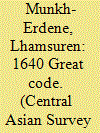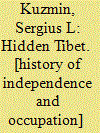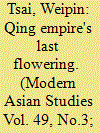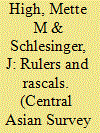| Srl | Item |
| 1 |
ID:
100027


|
|
|
|
|
| Publication |
2010.
|
| Summary/Abstract |
Two recent studies, Johan Elverskog's Our Great Qing (2006) and David Sneath's The Headless State (2007), have made bold and fascinating contributions to overcoming the lingering legacy of representing and framing the pre-modern Inner Asian social and political order in terms of evolutionist, nationalist or nation-statist logics. Joining the cause and building on these works, yet critically examining them, this article argues that the late sixteenth and early seventeenth-century Mongolian political order was akin to that of the Holy Roman Empire and the 1640 Great Code was an Inner Asian parallel to the Treaty of Westphalia.
|
|
|
|
|
|
|
|
|
|
|
|
|
|
|
|
| 2 |
ID:
190571


|
|
|
|
|
| Publication |
Dharamsala, Library of Tibetan Works and Archives, 2011.
|
| Description |
vii, 536p.pbk
|
| Standard Number |
9789380359472
|
|
|
|
|
|
|
|
|
|
|
|
Copies: C:1/I:0,R:0,Q:0
Circulation
| Accession# | Call# | Current Location | Status | Policy | Location |
| 060384 | 951/KUZ 060384 | Main | On Shelf | General | |
|
|
|
|
| 3 |
ID:
139691


|
|
|
|
|
| Summary/Abstract |
The Great Qing Imperial Post Office was set up in 1896, soon after the First Sino-Japanese War. It provided the first national postal service for the general public in the whole of Chinese history, and was a symbol of China's increasing engagement with the rest of the globe. Much of the preparation for the launch was carried out by the high-ranking foreign staff of the Chinese Maritime Customs Service, an influential institution established after the first Opium War.
With a mission to promote modernization and project Qing power, the Imperial Post Office was established with a centrally controlled set of unified methods and procedures, and its success was rooted in integration with the new railway network, a strategy at the heart of its ambitious plans for expansion. This article explores the history of this postal expansion through railways, the use of which allowed its creators to plan networks in an integrated way—from urban centres on the coasts and great rivers through to China's interior.
|
|
|
|
|
|
|
|
|
|
|
|
|
|
|
|
| 4 |
ID:
100028


|
|
|
|
|
| Publication |
2010.
|
| Summary/Abstract |
This article examines the politics of gold mining in the Mongolian cultural region during the Qing period and today. By drawing on archival material and accounts by travellers of the period, the authors situate the current mining boom within its greater historical context. Since the exploration of gold has been surrounded by enduring notions of exclusivity and purity, the article shows how mining for gold has historically been closely related to Mongolian practices of political rulership. By examining the current mining boom in Mongolia from a broader historical perspective, the article argues that this extractive economy involves much more than a search for profit.
|
|
|
|
|
|
|
|
|
|
|
|
|
|
|
|